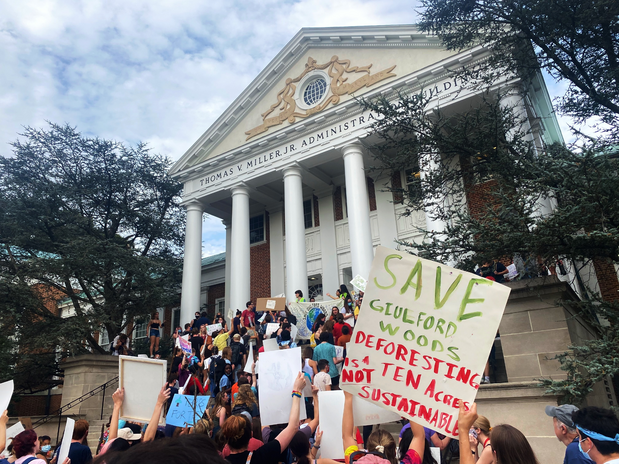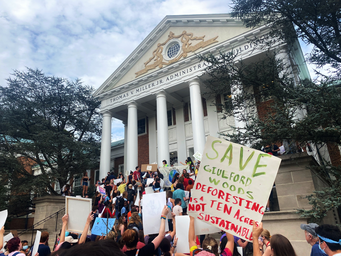University of Maryland students and College Park community members gathered in front of McKeldin Library Friday afternoon to make signs, hear speeches and sign the Save Guilford Woods petition in protest of deforestation of the Guilford Woods area.
Guilford Woods, a 40-acre forest located at the southwestern edge of the university’s campus, will be the site of Gilbane Development Company’s nine-acre housing project. While Gilbane and this university say the project, called the Western Gateway development, would only take up a fraction of that land, activists say Guilford Woods spans a much smaller area — 15 acres, not 40 — according to The Diamondback.
This would mean that fewer acres than were originally claimed would remain untouched.
Groups like Save Guilford Woods and Friends of Guilford Woods formed at the start of 2021, when the public first learned about the plans for deforestation. The Save Guilford Woods petition launched mid February 2021. These groups run websites and social media accounts to bring awareness to the issue. They were joined by organizations including the Sierra Club, Seventeen for Peace and Justice and the Anacostia Watershed Society to organize the protest.
Speakers at the rally included Sen. Paul Pinsky D-M.D., Chris Williams, president of the Anacostia Watershed Society,UMD professor Amy Sapkota, members of the Prince George’s County Sierra Club and undergraduate and graduate students from this university.
The speakers emphasized the importance of Guilford Woods and Guilford Run for the health of the ecosystem. Williams voiced his concerns over the destruction of the river system in Guilford Woods.
“Rivers start as small streams and wetlands upstream. And that’s what Guilford Run is. It’s a cradle. It’s a birthplace of an entire river system. And it’s forests like Guilford Woods that protect and nurture these small river and wetland systems, that are the cradles, the birthplace of rivers,” Williams said.
Protestors were not only concerned over the environmental impacts of deforestation. A privatized company purchasing the land from a public university does not sit particularly well with some of the community.
“One of the trade-offs is building eight private homes, virtually on the campus. And I have to tell you as someone who’s on this campus a fair amount, that doesn’t sit well with me. I think we have to minimize the privatizing of our public university,” Pinksy said in his speech.
Protestors carrying handmade signs and posters walked across the mall to the steps of the Thomas V. Miller Administration Building to hear from more speakers. As they walked, they chanted things like “Stop the chop,” “Save Guilford Woods” and “We say no way to the Western Gateway.”
Many protesters were concerned that although the university is addressing housing concerns, it seemed like students are being forced to choose between affordable housing and protecting the environment.
“I would first like to say first and foremost that I strongly support affordable graduate housing. I am a member of the graduate faculty and I’ve seen firsthand the challenges that our graduate students experience securing affordable housing,” environmental health sciences professor Sapkota said during her speech. “However, to address this challenge, we need to apply creative, forward-thinking, evidence-based approaches that are in line with our campus sustainability values and are cognizant of our ongoing climate crisis.”
Jan-Michael Archer, one of the event organizers and a graduate student, had similar thoughts.
“As a graduate student, I feel very good about the university wanting to address the affordable housing crisis that we are facing, but I feel very cheated that this is the way that they’re going about it,” he said. “I feel like they are ‘grad-washing’ this project to make it seem like graduate students will benefit the most from this when the housing they’re putting up is not going to be affordable for any graduate students.”
Archer got involved in the protest and the movement when he joined the Students for Guilford Woods organization a few weeks ago, he said. He worked with other students in the group to plan the rally.
The protest attracted activists of all ages. Janet Gingold, chair of the Prince George’s County Sierra Club, said she was first introduced to environmental activism in the 1970s, while she was completing her undergraduate degree.
After retiring, Gingold started participating in environmental activism more frequently again, because she didn’t like the way her generation was leaving the planet. Gingold has been on this planet long enough to notice major changes in the environment, she said.
“That’s why you saw a lot of people here in their late ‘60s,’70s and even ‘80s. Several folks here were well into their 80s, and it’s because they see the change that has happened during their lifetimes,” Gingold said.
During the University of Maryland Senate meeting on Oct. 7, university President Daryll Pines made numerous comments dismissing the opposition to the Western Gateway project.
“What I’ve discovered is that this is simply purely emotional for many people, and not necessarily completely based on rationale and science,” Pines said during the meeting, according to the Diamondback.
This particular response upset many individuals who rallied on Friday in support of the Save Guilford Woods initiative, including Gingold.
“How can you possibly read the science and not get emotional about the fact that our planet is being trashed in the name of profit? Yes, it’s emotional, but it’s also very firmly based in science,” Gingold said.



